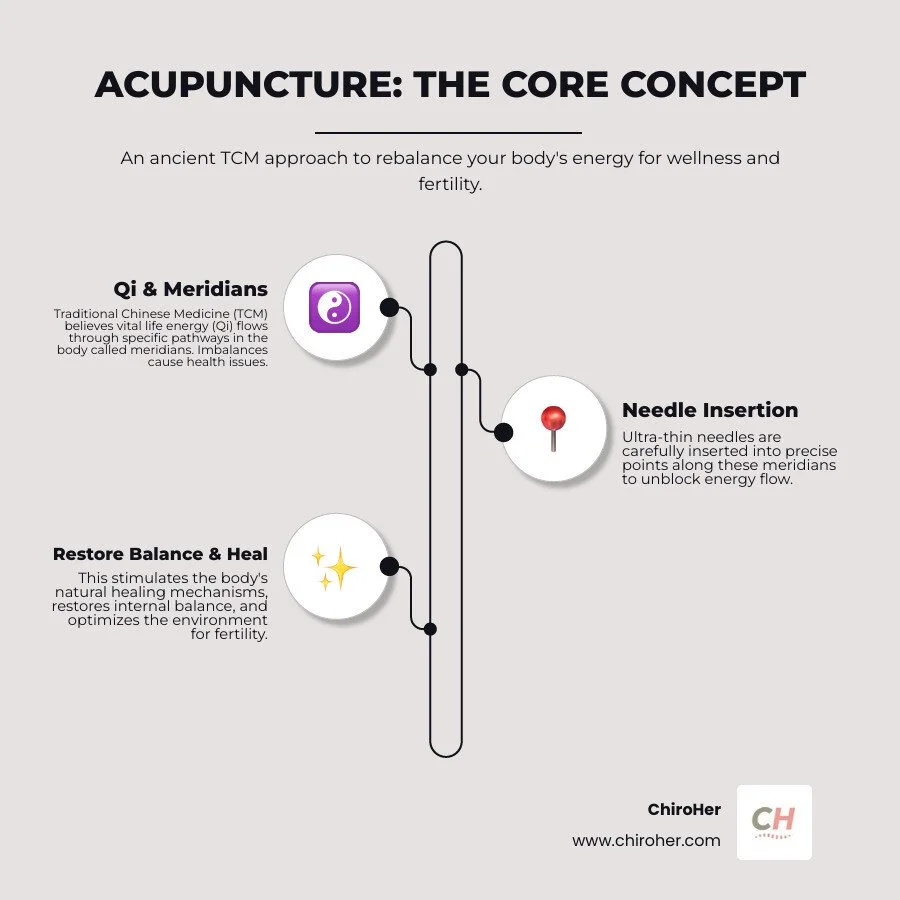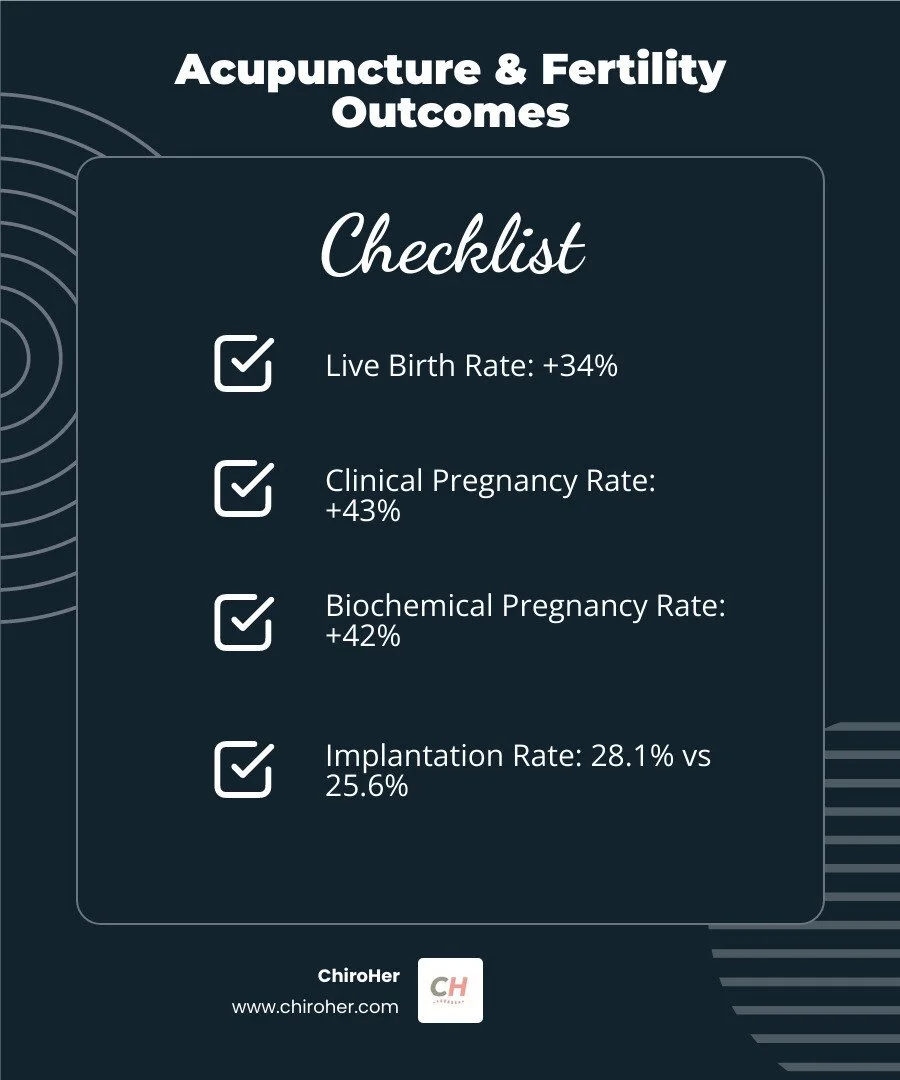Needle-ing for a Baby? Exploring Acupuncture and Fertility
An Ancient Practice for Modern Fertility Goals
Couples facing conception challenges are increasingly seeking acupuncture and fertility treatments. If you're struggling with infertility, you're not alone. Research shows that 8-12% of couples worldwide face fertility challenges. The emotional toll can be overwhelming, with one study finding that women with infertility experience stress levels equal to those diagnosed with breast cancer.
Many couples are turning to complementary approaches like acupuncture alongside conventional treatments. This ancient Chinese practice involves inserting thin, sterile needles into specific points on the body to restore energy flow and promote healing. While scientific evidence is mixed, research suggests acupuncture may help by regulating hormones, increasing blood flow to reproductive organs, and reducing stress.
Hello, I'm Dr. Michelle Andrews, founder of ChiroHer in Oklahoma City. While my specialty is chiropractic care for women, I work closely with patients exploring complementary approaches to fertility, including acupuncture as part of their wellness plan. I've seen how holistic care can support women through their most challenging health experiences.
Acupuncture is a key component of Traditional Chinese Medicine (TCM), which is based on the concept of a vital life energy called Qi (pronounced "chee") flowing through pathways called meridians. An imbalance in Qi can lead to health issues, including infertility. The practice of Acupuncture uses ultra-thin needles inserted at precise points to restore balance and stimulate the body's natural healing. For fertility, the goal is to optimize the body's internal environment to improve the chances of conception.
How Might Acupuncture Help with Fertility?
The potential ways acupuncture and fertility treatments interact are multifaceted. Here’s how it may help:
Hormone Regulation: Acupuncture may stimulate the endocrine system to help balance key reproductive hormones like estrogen, progesterone, FSH, and LH, which are critical for ovulation and menstrual regularity.
Increased Blood Flow to Reproductive Organs: A frequently cited benefit is increased blood flow to the uterus and ovaries. Better circulation can nourish the ovaries, potentially improving egg quality, and create a thicker uterine lining for implantation. Scientific research on uterine blood flow supports this, showing electroacupuncture can improve uterine blood flow in infertile women.
Reduced Stress and Anxiety: The emotional toll of infertility is immense. Chronic stress can disrupt hormones and ovulation. Acupuncture helps calm the nervous system and lower stress hormones like cortisol, creating a better environment for conception. We have seen how Acupuncture for Stress Relief can significantly impact well-being.
Neurotransmitter and Immune Support: Acupuncture may trigger the release of endorphins (mood elevators) and modulate the immune system, both of which can positively influence the reproductive system and support embryo implantation.
What the Research Says About Acupuncture and Fertility
The scientific community continues to explore the effectiveness of acupuncture for fertility, with mixed but often promising results. A large meta-analysis of 27 studies found that when used with other fertility treatments, acupuncture improved several outcomes:
Live Birth Rate (LBR): A 34% higher rate in the acupuncture group.
Clinical Pregnancy Rate (CPR): A 43% increase in the acupuncture group.
Biochemical Pregnancy Rate (BPR): A 42% higher rate with acupuncture.
These statistics suggest acupuncture may offer a tangible advantage. However, the research is not uniform. In one study of women undergoing IVF, acupuncture showed no significant difference in live birth rates. This highlights the complexity of the research, where factors like study design, practitioner skill, and even a potential placebo effect can influence results. More high-quality studies are needed for definitive answers.
More Than Just Conception: The Emotional Benefits
Beyond the physiological impacts, a consistent benefit of acupuncture for fertility is its effect on emotional well-being. The process of trying to overcome infertility can be incredibly stressful. As one study revealed, women with an infertility diagnosis experience stress levels comparable to those with a breast cancer diagnosis. This emotional burden can create a vicious cycle, as chronic stress may hinder conception.
Acupuncture offers a powerful tool for managing these emotional challenges. It provides a calming, supportive environment that can reduce stress, anxiety, and depression. By stimulating the nervous system and promoting relaxation, acupuncture can quiet the mind and alleviate the pressure associated with trying to conceive. This stress reduction has physiological benefits, as lower stress hormones create a more favorable internal environment for reproductive processes. At ChiroHer, we believe supporting emotional well-being is an integral part of the fertility process.
A Practical Guide to Acupuncture and Fertility
Considering acupuncture and fertility treatments involves practical questions. At ChiroHer, many patients combine acupuncture with conventional treatments like in vitro fertilization (IVF) or intrauterine insemination (IUI) for a comprehensive approach.
Acupuncture works alongside your medical treatments, not as a replacement. It adds a supportive layer to your fertility plan, helping to optimize your body’s processes while providing stress relief.
What to Expect During an Acupuncture Session for Fertility
If you're new to acupuncture, here’s what a typical fertility-focused session involves:
Initial Consultation: Your first visit will be thorough. The acupuncturist will review your health and reproductive history, treatments you've tried, and lifestyle habits to create a personalized plan.
TCM Diagnosis: A unique part of the process is the tongue and pulse diagnosis. A practitioner like Megan Scott, LAC from Cleveland Clinic explains that these assessments offer insights into your body's internal balance.
Needle Placement: Ultra-thin, sterile needles are inserted into specific points. You might feel a slight pinch or tingling, but most patients find the experience relaxing. Common points are on the lower belly, ankles, ears, and hands.
Relaxation: Once the needles are in, you'll rest comfortably for 20 to 40 minutes. Many patients find this a peaceful break in their day. The entire appointment usually lasts about an hour.
Timing, Safety, and Finding a Practitioner for Acupuncture and Fertility
Getting the timing right with acupuncture and fertility treatments can make a difference. Here are some key considerations:
When to Start: Most practitioners recommend starting treatment about three months before you plan to conceive. However, it's never too late to start, even during an IVF or IUI cycle.
Session Frequency: Treatment plans often involve weekly sessions, especially at first. If you become pregnant, treatment may continue through the first trimester to support a healthy pregnancy.
Safety: Acupuncture is safe alongside conventional fertility therapies. Risks are minimal, such as minor bruising. Always use a licensed practitioner who uses sterile, disposable needles. It's crucial to inform your acupuncturist if you are or might be pregnant, as certain points should be avoided.
Finding a Practitioner: Look for a licensed acupuncturist with specific experience in treating infertility. You can start your search at www.nccaom.org. A good practitioner will be willing to collaborate with your medical team.
Costs, Insurance, and Other Considerations
Understanding the financial aspects of acupuncture and fertility treatments helps you plan effectively.
Costs: Session costs vary by location and practitioner experience. Ask about package deals for multiple sessions, which can reduce the overall cost.
Insurance: Coverage for acupuncture is mixed. Call your insurance company directly to ask about your benefits. Some plans cover it for specific conditions, while others do not.
Questions to Ask: Before committing, ask a practitioner about their experience with fertility, how they structure treatment plans, their license and certification, and their fees. It's also important to know if they collaborate with medical doctors like reproductive endocrinologist Jenna Rehmer, MD, who emphasizes the importance of communication between providers.
Our philosophy at ChiroHer is to provide award-winning care in a comfortable setting where you feel supported as you explore all available wellness options.
This article is for informational purposes only and is not a substitute for professional medical advice, diagnosis, or treatment. Always seek the advice of your physician or other qualified health provider with any questions you may have regarding a medical condition.






